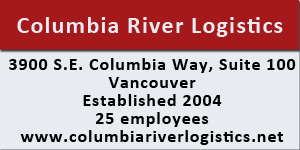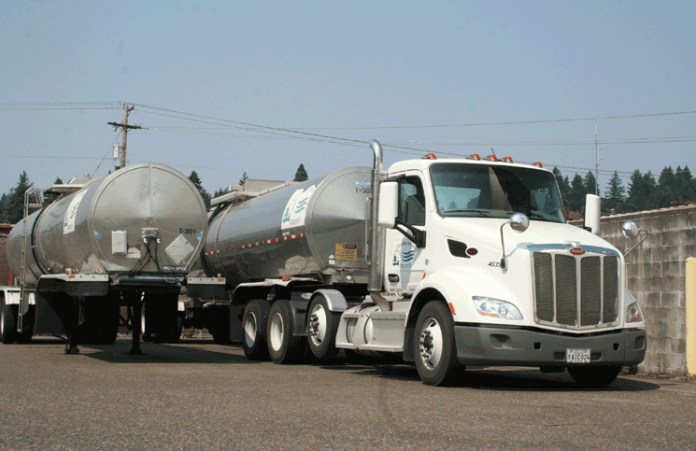Disruption by the internet hasn’t been kind to the pulp and paper industry, but local companies like Columbia River Logistics have learned to adapt.
With declining use of paper products – especially with declining subscriptions to print newspapers – the paper industry has had to specialize and pare down. But as a logistical transportation service for the paper and pulp industry, there’s still a need to fill. And Columbia River Logistics is pretty much the only player in the area that specializes in pulp and paper transportation, said Boris Yatskov, general manager and warehouse manager.
“There’s not too much competition for what we do,” Yatskov said. “The industry slowed down. A lot of clients don’t want to purchase paper anymore – especially the newspaper industry, they’re phasing out. But we’re still moving paper with rail cars without any concerns at this point.”
Columbia River Logistics was established in 2004 as part of Belgravia Investments, which also owns West Linn Paper in Oregon. The logistics company deals with pulp and paper storage at its warehouse on Columbia Way in Vancouver, gathering pulp shipments by rail and delivering them by truck as needed to local paper companies in greater Portland and Southwest Washington. The company also collects finished paper products and delivers them via truck locally or back to the railways for deliveries around the country.
“We support our clients with storage of pulp and paper,” Yatskov said. “We receive pulp via rail cars, and when they need it, we deliver it.”
According to Yatskov, CRL’s main customers are West Linn Paper, Georgia-Pacific’s Camas mill and the Clearwater Paper Corporation in Vancouver.
 West Linn Paper, which has the same parent company but was founded in 1889, has been adapting to the squeeze from declining paper use from the print news industry constantly over the past 20 years, said Penny Machinski, environmental manager and historian for the company.
West Linn Paper, which has the same parent company but was founded in 1889, has been adapting to the squeeze from declining paper use from the print news industry constantly over the past 20 years, said Penny Machinski, environmental manager and historian for the company.
“In terms of the mill, we’ve certainly been affected by the downturn in the print news industry,” Machinski said. “We’re trying to diversify our offerings to compensate. Mills are closing all over the country, but we’re hanging in there.”
Part of West Linn’s diversified product line is coated free sheet magazine stock, used in glossy magazines. West Linn is the only mill that makes that type of paper on the West Coast.
“We’ve also developed our ability to do small order, quick turn service,” Machinski said. “Really all the paper we sell is in big rolls, not to the retailer directly. We’re really in the commodity market at this point.”
There’s not a lot of competition for them in the Pacific Northwest, she added, because most paper companies focus on certain kinds of paper stock, and they don’t overlap with West Linn’s stock.
But that said, disruption of the paper industry by the internet and other video devices continues to take a toll.
“I’ve been here 20 years and they were feeling it before I started,” Machinski said. “The pressure hasn’t relented.”
Despite the market challenges, Columbia River Logistics has enough work with its three big local clients to keep the truck and rail wheels turning, Yatskov said.
In fact, sometimes CRL still gets in more work than its warehouse space can handle. The company sometimes gets 30 to 60 rail cars to unload over four days.
“We can unload 50-55 rail cars per week the way we are now,” Yatskov said. “There’s not enough space. We need more doors to put rail cars on, more switches from BNSF.”
CRL has 25 employees and two facilities, one in Vancouver and one in Las Vegas, Nevada. But expansion plans seem unlikely because of the struggling industry, Yatskov said.
For now, the company’s objectives are to make sure deliveries are on time and to keep costs low.
“We have enough storage to support our clients, although I suppose it’s possible we could grow in the future if we needed to,” Yatskov said. “You never know.”




